#latin american witchcraft
Text



haven’t been on here in a fat fucking minute so here’s a huge photo dump, been doing great and basking in alllll my well deserved good fortune and abundance 💯💯
#two spirit#native pride#native american#indigenous#witchblr#latin american witchcraft#witch community#tarot witch#native beauty#native excellence#indigenous americans#witchy#poc witch
6 notes
·
View notes
Text
i need to know how to magic when you're broke and depressed, like i want to do things but i can't bring myself to do the simplest of task, least of all try to conect and cast a circle and all that
0 notes
Text
THE HACIENDA is up for TWO Goodreads Choice Awards!
I am absolutely thrilled to announce that THE HACIENDA is up for a Goodreads Choice Award in two categories, Horror and Debut Novel!! 😭 If you have a Goodreads account, I would be honored if you cast a vote for your friendly neighborhood hot priest 🕯️
(Especially in the Horror category.)

#goodreads#horror books#Gothic books#Mexican Gothic#witchcraft#hot priest#writeblr#writers of tumblr#authors of color#BIPOC books#bipoc horror#creative writing#Rebecca#latin american culture#mexican books#mexican author#writing advice
39 notes
·
View notes
Text
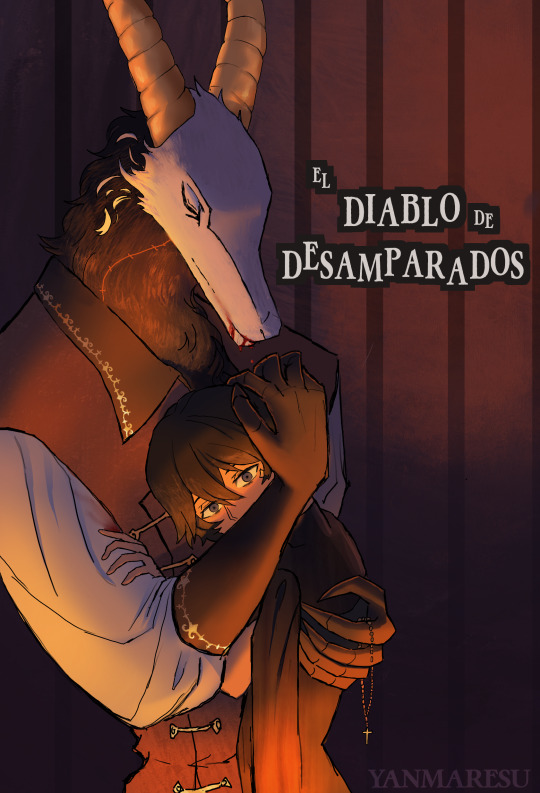
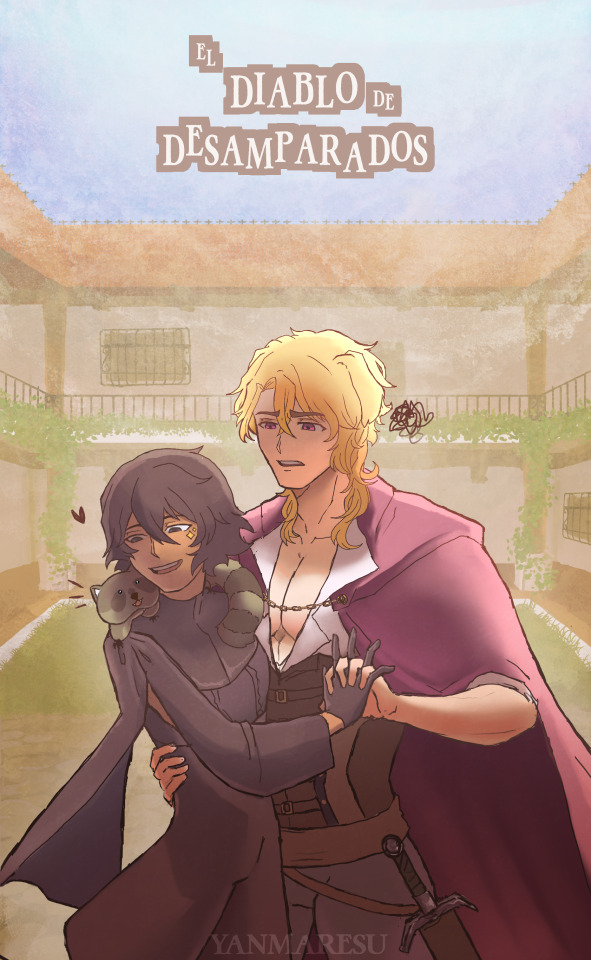
"After being wrongfully accused of witchcraft, Camile (mc) finds themselves jailed and sentenced to death. Barely having some days left to live and with no hope in sight to demonstrate their innocence, Camile takes the risk of making a deal with a demon, Corrado, to help each other escape from their imprisonment. However, it's easier to say it rather than do it, since the captain of the church's knighthood will be intent on bringing them back."
.
"El Diablo de Desamparados" will be a yandere visual novel inspired by "Beauty and the beast" and latin american horror folklore. It will possess an afab renamable mc, the option to choose the mc's pronouns, and the option to use or not chest binding. *There's no release date yet. Demo is in work. *It will be available in both Spanish and English.
#merga literal va a ser ambos idiomas por que soy remanca para el inglés jaja x'd#El Diablo de Desamparados#Corrado#Camile#Fabian Costella#yandere visual novel
310 notes
·
View notes
Text
Who is the bruja?
About Brujería and Curanderismo in Latin America, and witchcraft from a latine perspective.
You’ll most likely see the term Bruja used in anglophone communities to refer to latine magic practitioners. By that definition, any latin american person who does some kind of magic is, in a way, a bruja/brujo/bruje. This use of the word comes from a place of reclamation of said latine heritage and of our cultural folk magic practices, particularly for hispanic latines. Similarly, you’ll see portuguese-speaking latines using the word bruxa, or bruxaria.
I can hear you already: But I am a spanish-speaking european! I am also a bruja!... given the context, you’re a witch, not a bruja. Brujería in the broader sense of the word, as is used in any conversation in spanish, can be translated to witchcraft. “Brujería” in the specific “latine magic practitioner” sense doesn’t have an english translation, and thus we keep the word in spanish, to signify that cultural tie to hispanic latin america. So no, in the context of an anglophone discussion of brujería, you’re not a bruja, in the same way that, while speaking a languange derived from latin, europeans are not latino/latine because they’re not from latin america.
That is, considering the modern use of the word, specially in online spaces. But if you speak to your Elders, you’ll hear something a little different...
People like to ask themselves “am I a born witch?”, and well, traditionally, a bruja is made, not born, and it specifically implies baneful work.
Old school folks will tell you that not just anyone who practices magic is a bruja, in fact, calling a Faith Healer a “Bruja”, could be taken as a major offense.
Many elders will make a distinction between dual roles of what we’ll call the Healer, and the Witch, for convenience’s sakes, since the words for naming either vary in each languange and culture. One of the better known examples I can give you is how in spanish, and across latin america, you’ll hear the duality between the Curandera and the Bruja.
The Curandera Heals, the Bruja Bewitches.
While the Healer is born, with a set of gifts or dones that are necessary to fulfill a role assigned at birth (or even before so), to serve their community. A Witch is made, by their own choice, in a personal quest for power and knowledge, and thus doesn’t act in favor of their community necessarily, instead, acts seeking their own benefit first, sometimes... in detriment of the community.
There’s nothing wrong with keeping our best interests in mind! In fact, a true Healer is taught to balance left hand and right hand work, one who cannot harm cannot heal, and I always say we must understand the wound and how it was made before we can understand it’s cures, but precisely because of that, the figure of the Witch stands out more. A Healer can do both, heal and harm. While the Witch... not necessarily. A Witch is, oftentimes, only capable to manipulate circumstances (and people) but not heal, and even when good intentioned, it can bring negative repercussions. That is why it has such a negative connotation traditionally, and why most of the older folks, or anyone trained by them, will likely avoid the term.
Note how I’ve been saying Healer or Gifted person instead of Curandera. Because having a don does not by itself make someone a curandera. Since I’ve seen more and more people using the term online, here’s a reminder that being a curandera is not a choice and does not refer to just anyone who practices herbal healing or any other healing modalities, it is a responsibility to the community you’re in. Nobody is born a priest or babalawo, and similarly nobody is born a curandera, while they could be gifted from birth, each curanderismo lineage will have their own initiations and traditions to train that person and turn them into a true curandero, and only then, the community will give the title to them, after working for years and earning their respect and love. The term curandera is only appropriate for someone who not only has a higher calling (vetted & confirmed by elders), but specifically someone who’s been properly trained and is already in service of their community.
With that in mind, bruja is definitely the right term for someone who’s just learning and is only doing magic for themselves or close friends and family.
But then... there’s some issue specifically with indigenous and afrolatine practices and descendants. During colonization, the church demonized our beliefs, called our Ancestral practices, Gods and Spirits “satan worship” and thus, our healers were called “brujas”. Hunted and killed specifically because indigenous culture & healing, aswell as african traditional practices, were targeted. That is, we were called “brujas” as part of a cultural genocide. Elders will often stay away from the term bruja not just because it doesn’t reflect their practice, but also because staying away from the words bruja and brujería was, and in some places stil is, simply a survival instinct. Choosing other words to identify, or even not speaking about it at all, along with the syncretism with christianity, were ways to survive that genocide, and pass on as much as possible in whispers and under catholic veils.
It is up to each practitioner to talk to their elders, learn their people’s history, and decide for themselves if they wish to reclaim the word, or if they’ll rather use more culturally-specific terms, or maybe both. I’ve known plenty of healers of many paths who’ll refer to themselves as brujas to outsiders, and will use more specific terms amongst kin (myself included).
While I respect (and support) the reappropriation of the terms bruja and brujería to refer to latine magic, I also believe it is important to know our history with these terms, and out of respect for our ancestors and the old traditions, also learn the proper names of things. Bruja may be a good way to identify for someone who’s just starting out in magic out of their own choice, who’s seeking community and doesn’t quite know their place in the bigger scheme of things, but also someone who, guided by proper elders and community, must dig deeper, and find their home. There’s specific names, even just in spanish, for different kinds of healers and workers. Are you an oracionista? huesera? yerbera? have you been trained in these practices? Only a skilled elder can identify if you possess any gifts, and teach you how to hone your own skills. And If you’re indigenous, you must take the time to reconnect to your indigenous community, to your own medicine, and learn the proper terms in your indigenous tongue.
My final thoughts: reclaiming brujería is important, but so is learning and respecting our culture & history. We have incredibly rich cultures, and reducing ourselves to just “brujas” is certainly an oversimplification, if not even an attempt from outsiders and appropriators to overgeneralize and commodify our cultural practices that we must fight against. We can appreciate brujería as an umbrella term for everything that unites us, and as a term to make understanding and communication between ourselves easier, while also acknowledging the history of the word, the huge diversity it covers nowadays and giving due respect to each of our corresponding cultures.
Thanks for reading!
#brujería#bruja#brujas of tumblr#witches of color#brujeria#santeria#santería#curanderismo#curandera#traditional witch#traditional witchcraft#folk magic#folk witch#folk witchcraft
319 notes
·
View notes
Text
100 days of productivity (9/100)
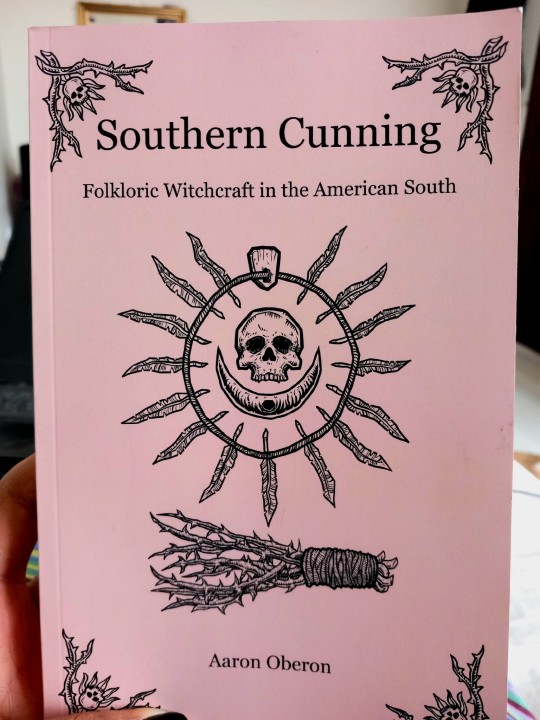
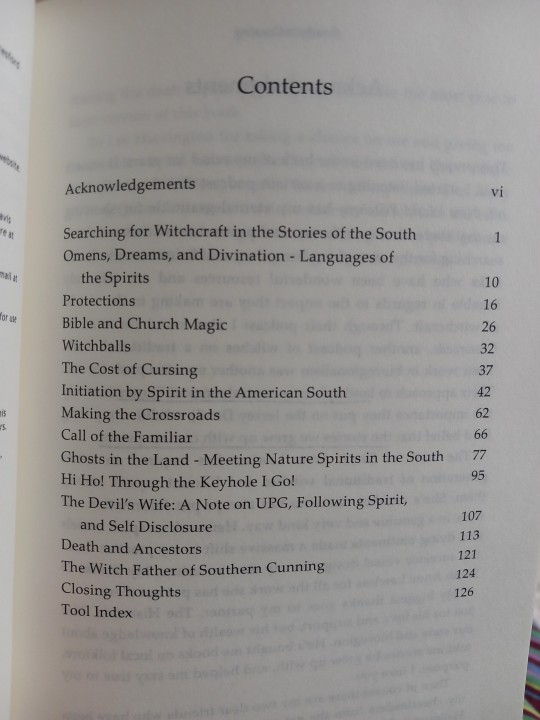
Tuesday, 28th of November
I didn't go to class today. I went to uni, stood outside for and hour and went home. I already miss my boyfriend so much :/ but I also have a lot to do for, so i can't think about him too much. My goal for today was to finish all the my research on the Uyghurs, which I didn't, but I still have some days, so I try not to panic.
One good thing is that some books y ordered arrived today, including a collection of Grimm's fairytails and Hans Christian Andersen's Fairytails 🤗
Productivity:
spent 3,5h researching for my presentation
sent an e-mail to my latin teacher
Selfcare:
Told some friends about my relationship issues
Watched a movie (Roxanne Roxanne)
Personal projects:
Copied what I had highlighted in the digital version of Southern Cunning: Folkloric Witchcraft in the American South (by Aaron Oberon) into the physical copy that arrived today
#100 days of productivity#study blog#study motivation#studyblr#studyspo#studying#student#study aesthetic
14 notes
·
View notes
Text
Witchblr PSA: Copal
Since it is that time of the year again, there is a chance that some of you may start seeing witchcraft correspondence posts suggesting to burn copal as an offering to ancestors or death gods. This a reminder that copal — both the tree and its resin — is closed. The copal tree is sacred and burning it or its resin if you are not Latine is cultural appropriation
Also if you are a non-Latine white westerner — especially if you're a non-Latine white USAmerican (gringo) — please consider how goddam disrespectful it is for you to burn copal for your ancestors when both USLatines and Latin Americans have suffered and still suffer horrific violence and oppression at white westerners' hands
17 notes
·
View notes
Text
Redefining Brujería + Seven Folk Remedies from Latin American Folk Brujas
Hey everyone!
I have a chance to write this article.
Hope you enjoy it, and share it you think someone else could enjoy it.
#witchcraft#wicca#magick#magic#witches#pagan#wiccan#paganism#Brujería#brujas of tumblr#brujos#folklore#folk Magic#folk Witch#dream Magic#dream witch#dream walker
5 notes
·
View notes
Text
Enchanted Mouras were said to be wise and magical nature spirits from Spain and Portugal. They were sometimes said to be darker skinned and/or Muslim and are guardians of treasure and mysteries. Spain in general had a population of people of color who were involved in all kinds of witchcraft and mysticism. This dates back to centuries and centuries ago!
So I really hope Wish does the magical women of that region justice. Disney always tries to honor different bloodlines of magic and mysticism. They really delivered recently with Encanto and Coco honoring Latin American beliefs and systems💗
8 notes
·
View notes
Text

@honeybiscuitsandlemontea Yeah I’m American but Catholicism in general is in every country around the world. There is no disregarding Latin American “folk Catholicism and magic”. You can’t be Catholic and a witch. The Catechism of the Catholic Church plainly states so in simple writing and it won’t change. Folk Catholicism is when people mix their culture ideas and add it onto their religion, trying to live with both paths. The Catechism is officially against any magic, occult, witchcraft, sorcery, so on and so forth. It’s not something I made up just stating the facts. I pray for all of those “”Catholic witches”” on tumblr as well as anyone who celebrates folk Catholicism that they may change their heart someday. Saints aren’t gods and goddesses, they are human beings. May God bless you. 🕊
#replies#obviously in a respectful way#culture won’t disappear#neither will Catholicism#so we will continue to see things#but I will always defend the faith regardless of tumblr culture#anyone is welcome to reply peacefully
65 notes
·
View notes
Text
INTRODUCTION TO WITCHCRAFT
These posts are based off my own personal study, these studies are taken from books, articles, posts and more that correlate with the type of practice i decided to take
I don’t promote my information in this blog as the ‘proper or correct’ one as witchcraft is a personal journey and everyone is gonna learn and do things differently than from what i post — That being said i am more than happy for people to use my blogs as some sort of reference or interest into the practice but it does not mean this is the ‘only’ way to do things.

BRIEF: Historically witches lived amongst nature, now a days witches live everywhere and can be literally anyone, they are not defined on who they are but rather who and what they choose to be/do, if that makes sense. They have a personal journey with witchcraft, a strong deep relationship with nature, and a relationship with one self that is developed over time regardless of the starting point — The Green Witch - Arin Murphy-Hiscock
I’m Italian and Mexican so i’ll dive in latin American and European Witchcraft
HISTORY: In the past witches were healers, they were mothers, daughters, sons, husbands, wives. Anyone could have been a witch as long as they were connected with nature and used nature as a mend to help others. — “In medieval and early modern Europe, where belief in witchcraft traces back to classical antiquity, accused witches were usually women who were believed to have used black magic (maleficium) against their own community, and often to have communed with evil beings, though British anthropologist Jean La Fontaine notes…” — these beliefs were mainly set off by the church as they feared that having people believe in anything that wasn’t their religion would falter off their power over the people, equally they did not agree for women to be leaders of any sort, and thus were correlated with worshipping the devil.
The term ‘flying on brooms’ and ‘devil’ would have likely have been depictions of drugs and hallucinatory rituals, as witches were mainly herbalists and medics, it was not uncommon for them to use strong plants as drugs.
Feminism & French Women in History: A Resource Guide — “Before the Scientific Revolution took hold, people looked to the Church to explain the mysteries of the earthly world. Frightening occurrences such as paralysis, a sudden seizure, or a baby born ill or disfigured left people looking for an explanation — and preferably someone to blame. The Church believed in the Devil and considered witches to be their willing disciples. It was therefore the duty of the Church to find and condemn them. In France approximately 2,000 witch trials occurred between the years 1550 and 1700. While some women admitted to their alleged powers, most women vehemently denied the accusations. The Church often resorted to torture in order to elicit confessions. The women targeted were typically marginalized women such as spinsters, widows, or those without a male protector. Many of the accused, while not convicted, were still subjected to a lifetime of suspicion and fear. Furthermore, women employed in healing occupations (such as laying-in-nurses) were in a vulnerable position. When children or mothers died during childbirth — as often happened — these nurses made easy targets. If they had the power to help, then by extension, they had the power to harm.”
— — — — — —
— — — — — —
Northern Italy experienced its first wave of witch trials earlier than most of Europe, and it fact experienced its peak during the Italian Renaissance. After a high-profile case in Milan in 1384, there were a number of witch trials in Italy during the 15th-century
Stregheria was and still is a practice mainly focused in Southern Italy — Stregheria (Italian pronunciation) is a neo-pagan tradition similar to Wicca, with Italian and Italian American origins.While most practitioners consider Stregheria to be a distinct tradition from Wicca, some academics consider it to be a form of Wicca or an offshoot. Both have similar beliefs and practices. For example, Stregheria honors a pantheon centered on a Moon Goddess and a Horned God, similar to Wiccan views of divinity — What Is Stregheria? — “Stregheria is a branch of modern paganism that celebrates early Italian witchcraft. Its adherents say that their tradition has pre-Christian roots, and refer to it as La Vecchia Religione, the Old Religion. There are a number of different traditions of Stregheria, each with its own history and set of guidelines.”
Stregheria appears to be based primarily upon the writings of Charles Leland, who published "Aradia: Gospel of the Witches" in the late 1800s. Although there's some question about the validity of Leland's scholarship, "Aradia" continues to be the basis of most Stregheria traditions. The work purports to be a scripture of an ancient pre-Christian witch cult, passed along to Leland by a woman named Maddalena.
— — — — — —
— — — — — —
Part 2 :coming soon….
#witchcraft#witches#fyp#for you page#tarot#witches of tumblr#witchblr#witchy aesthetic#grimoire#digital grimoire
6 notes
·
View notes
Text


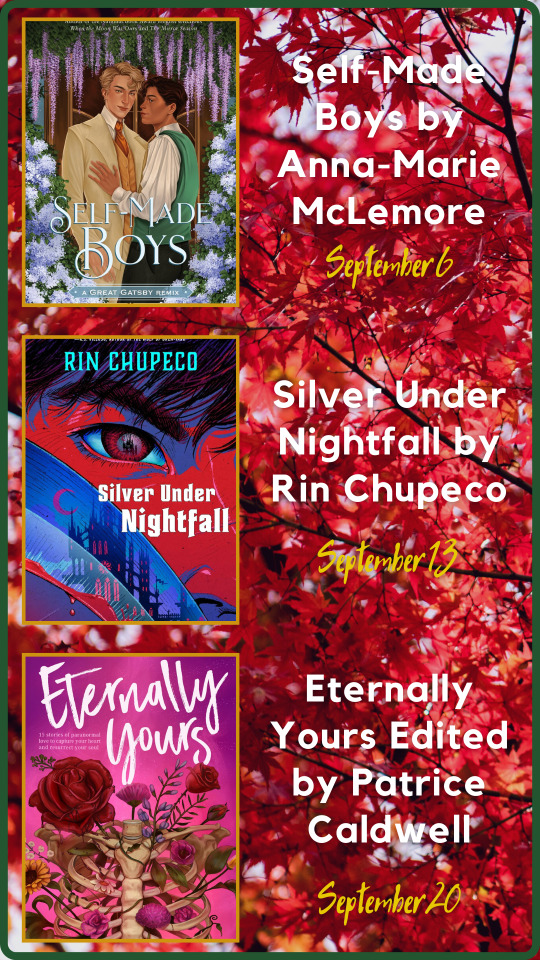

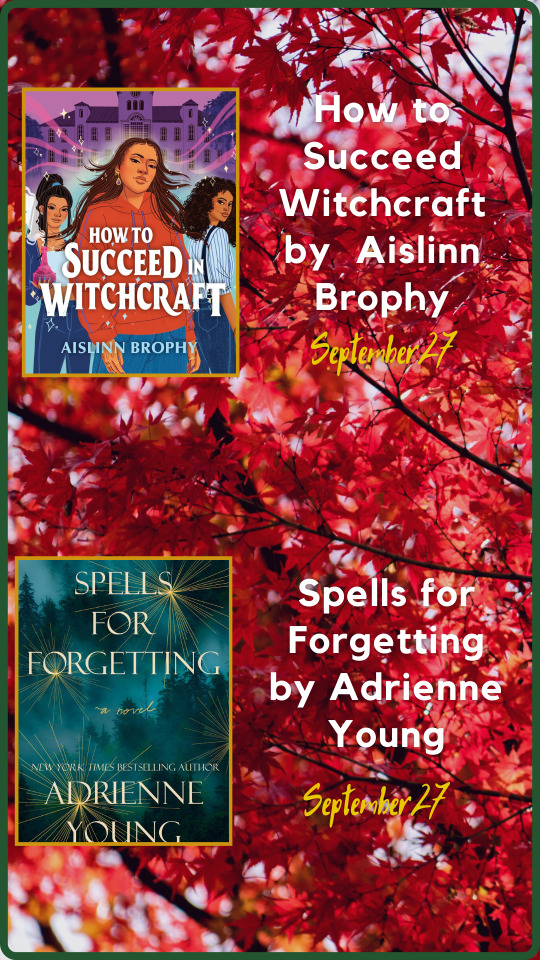
Welcome to September!
As always, check under the cut for more on each~
Garlic & the Witch is the sequel to Paulsen's adorable, cozy middlegrade graphic novel, Garlic & the Vampire. I'm looking forward to more cute art, fall vibes, and anxiety rep.
The Gathering Dark is an incredible collection of folk horror! I was lucky enough to read this anthology in advance, and recommend it for all YA horror fans, lovers of folk tales, and anyone into local legends.
Our Shadows Have Claws is another short story collection, this one with all Latine authors and representation! Each of these stories are takes on different Latin-American monsters.
Self-Made Boys is a fantastic adaptation of The Great Gatsby that I've already been fortunate enough to read! This book reimagines the classic as a trans, Latine, queer story of classism, colorism, and America.
Silver Under Nightfall is a vampire story of queer love and courtly intrigue that was also pitched for fans of Castelvania! Chupeco has put out some interesting, weird stuff, so I have high hopes!
Eternally Yours is an anthology of paranormal romances, and one that seems really inclusive! This collection looks super fun.
Less is Lost is a surprising sequel to Greer's Less! The first book was bittersweet, fun, and solid, and I'm really looking forward to seeing how the story continues.
The Golden Enclaves is the long awaited final book in the Scholomance series, a trilogy full of demons, denying your fate, and golden retriever boyfriends.
How to Succeed in Witchcraft is a queer, witchy book of prestigious schools, breaking racist barriers, and musical theatre. It looks super fun!
Spells for Forgetting is a magical mystery of a small island community, as well as lost love.
58 notes
·
View notes
Text
🌊Introduction 🦀
Hello! Im witchonthebeach (or maybe just Crab) and I am someone starting a witch journey since September 2023 towards a more spiritual life, although I am not entirely sure if witchcraft is the right path for me or what exactly I want to get from it. Despite this doubts I have been enjoying it greatly, especially the looking-for-resources and reading part.
Even though I only started officially a couple of months ago, I have been playing around with tarot reading for 5 years. I am also a big fan of sigil work and lately I'm exploring energy work as well (so far, it's been a struggle lol).
Despite the sea motifs I don't practice witchcraft related to the sea because I live far from it :(
I am a latin american adult that has been thought a lot of questioning when it comes to spirituality, raised evangelical and then becoming atheist. Nowadays I'm still not sure about gods and so far I am not doing any work related to gods, although I definitely appreciate the beautiful practices I have seen connected to divinity.
This blog is a sort of resources center for me, I go around looking for interesting things about witchcraft and save it here, but I need to get better at tagging stuff. Sometimes I also post my own stuff.
2 notes
·
View notes
Text
Round 2


Patricia Dorval. Born on a slave ship, she was later abandoned in the streets of America. She later met her new caretaker, from which Patricia learned witchcraft. As an adult, she goes back to her mother's homeland to find out a bit more about her origins, that however awakens the curse in her blood. It's implied she kills people who are racist to her. Canonically Haitian.
Meta Knight. Goth latine representation, he's an orb with a sword and he's not afraid to use it! A little menace, but he looks cute. Believed to be Mexican because of his accent.
Some funny moments of mexican MK.
14 notes
·
View notes
Text
Brujas reblog please!
I need to find my people!!!
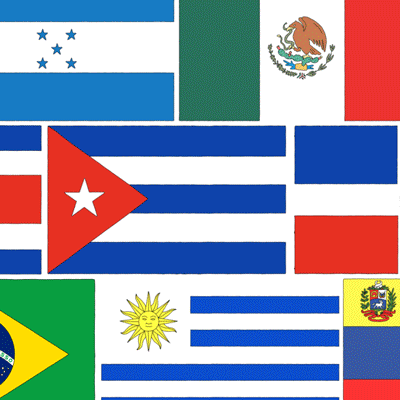
Reblog if you’re
a Brujería practitioner
a latin american ATR (African Traditional Religion) practitioner
or just latine practicing some kind of magic or witchcraft!

#witchblr#witch#witches of color#brujeria#brujería#bruja latina#witchcraft#African Traditional Religion#umbanda#candomblé#santería#santeria#latin witches#latine witches#latina witch#latino witches#catholic folk magic#catholic witchcraft#christian folk magic#folk witch#folk witchcraft#folk magic
137 notes
·
View notes
Text
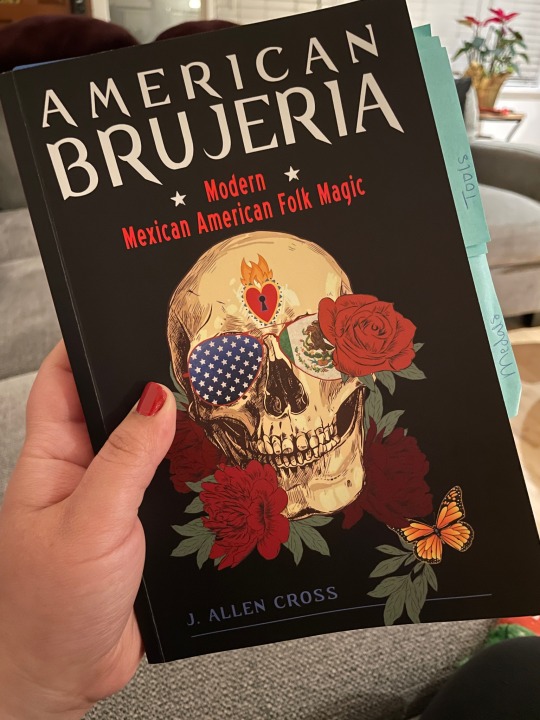
Just finished reading American Brujeria by J. Allen Cross and I have to say I LOVE this book so much! I recommend it to everyone but especially for Mexican American or Latin@ witches. Even if you don’t practice witchcraft, this is a beautiful book that made me feel proud of my roots and of the magic of my people and culture. A huge part of this book was so affirming for me as a Mexican American and as someone who is “in between” two worlds and two cultures. Definitely something that I will keep referring back to. I also recommend the podcast “Invoking Witchcraft” which this author co-hosted on. They have discontinued the podcast but the episodes are still up and have lots of valuable information!
#witchblr#witchcraft#american brujeria#witch community#witchcraft books#folk magic#latinx books#mexican american#folk practice
22 notes
·
View notes